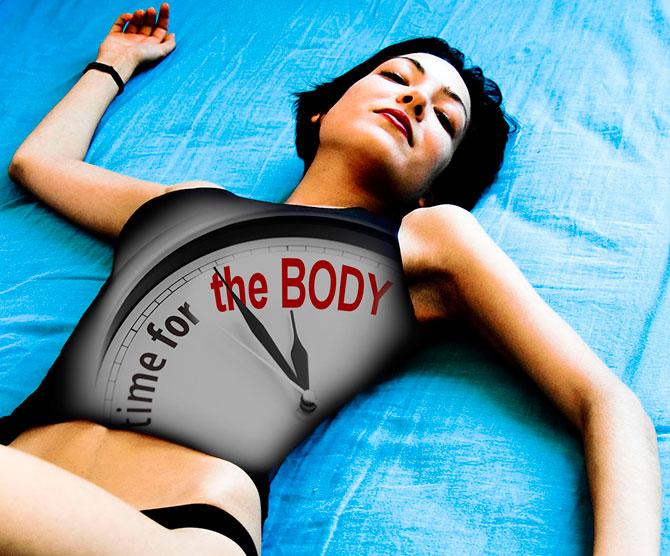Photographs: Collage created by images by PJ and Marsmetn/Creative Commons Shameem Akthar
...And how you can reset it!
Shameem Akthar, yogacharya trained with the Sivananda Yoga Vedanta Centre, takes you through some major bio-events in your daily life pattern that may help you lead a more controlled and powerful life.
There are several sciences that have borrowed from the idea of the bio-rhythm.
Chronobiology, for instance, is a new alternative therapy which gives you a chart individualised and based on your birthday, and uses the idea of 23-day/28-day/33-day cycle.
This is still under scrutiny by hard core science.
But the daily rhythm that our body is used to -- called the circadian cycle -- is well-known. It is based on the broad but specific patterns of our body as decided by our hormones.
It is good to be aware of this, to help maximise your day.
The circadian cycle has a broad time frame, split over the entire day.
It starts from when the sleep hormone melatonin begins to wind down (reacting to the flow of daylight into the retina), to the spike in blood pressure, muscular efficiency, bowel movement, the spike in sleep hormones as it begins to flow and then peak.
This is the pattern that goes awry on and after long-haul flights when you move through different time zones.
Shameem Akthar, yogacharya trained with the Sivananda Yoga Vedanta Centre, takes you through some major bio-events in your daily life pattern that may help you lead a more controlled and powerful life.
Please click NEXT to continue reading...
Bowel movement
Image: Those who do not have a regular wake-up time or an early one suffer from constipation or not passing stools efficiently.Photographs: D. Sharon Pruitt from Hill Air Force Base, Utah, USA/ Creative Commons
Oversleeping is the need of the sleep-deprived.
Those who do not have a regular wake-up time or an early one suffer from constipation or not passing stools efficiently.
The entire system of excretion is a bio-rhythm that is managed by the body’s natural clock in the brain, the suprachiasmatic nucleus.
It is triggered before 9 am. If it is not heeded by then, it may create constipation.
If bowel movement is regularly forced and the evacuation is not efficient, it could create toxicity.
Most of us in any case are said have a deposit of faeces weighing about 2.5 kg within the bowel. That cannot be a happy condition for our body!
Sticking to the natural rhythm of the body for evacuation is a sure way of maintaining peak health of the colon, and thus the detox mechanism of the body.
Please click NEXT to continue reading...
Peak alertness
Image: The mind is at its most alert between 9 and 10 am.Photographs: lululemon athletica/Wikimedia Commons
The fact that the level of the sleep hormone melatonin begins to fall as sunlight wakes you up, means that the brain also shrugs off its lethargy and begins to become efficient.
This usually happens between 9 am and 10 am, when the mind is at its most alert.
This is a good time to allot to your major work for the day.
Have your power breakfast ahead of this time, give yourself time to settle down at work, then punch into your most challenging task at around 10 am and you could be on a roll!
Please click NEXT to continue reading...
Sleep pattern
Image: The sleep cycle is at its deepest between 2 am and 4 am.Photographs: Mark J. Sebastian/Creative Commons
Sleep is also decided by the pineal gland’s response to daylight and the flow of the melatonin hormone.
In teenagers this usually flows late, creating the 'owl' syndrome -- staying up late and sleeping in late.
In adults, though, the melatonin begins to flow in the early evening and maintains a steady pattern, creating a huge peak between 2 and 4 am, when the sleep cycle is at its deepest.
If you are forcing yourself to keep awake, you are interrupting the most relaxing phase of your sleep cycle.
Breaking this natural pattern can lead to several disorders because when the circadian pattern is disrupted, it affects other 'biological clocks' elsewhere in the body too.
Please click NEXT to continue reading...
Muscle efficiency
Image: Time your workout between 3 pm and 5 pm.Photographs: Mike Baird from Morro Bay, USA/bairdphotos.com/Wikimedia Commons
Co-ordination and muscle efficiency -- initiated by hormones like ACTH -- is believed to be at its best between 3 pm and 5 pm.
This could be the time when you want to take a 'work-out break' if you have the luxury to do so.
Timing your meal to be able to accommodate your work-out and hitting the gym or choosing your 'me-time' with your trainer during this time would mean that you get the best results and most satisfying work-out within this time-frame.
Please click NEXT to continue reading...
Eating patterns
Image: Eating on time and not too late can help control weight as well as prevent chronic problems like diabetes and metabolic syndrome.Photographs: Bradley J/Creative Commons
Eating on time and not too late can help control weight as well as prevent chronic problems like diabetes and metabolic syndrome.
The biological clock in the brain is the main one, but there are 'clocks' all over the body.
These peripheral clocks are equally important in maintaining order and harmony.
If that is constantly disrupted, what happens is that the peripheral clocks confuse the main clock in the brain.
There is conflict between similar systems and this is said to be the biggest culprit in weight gain, fat storage, and metabolic disorders.
Having a heavy breakfast and progressively lighter meal for dinner prevents such imbalances and disharmony.
It helps maintain your bio-rhythm patterns of eating.







Comment
article